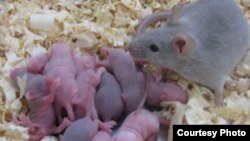Some autistic behaviors may have their roots in the gut — or, more specifically, what is missing from the gut.
Autism is a potentially disabling communication disorder that has long perplexed neuroscientists. While some children are only mildly affected, others are almost completely withdrawn, displaying severe anxiety, repetitive behaviors and angry outbursts.
Researchers suspected that the anti-social behaviors might be tied to the diet of the child and the child’s birth mother, according to Mauro Costa-Mattioli, a professor of neuroscience at Baylor College of Medicine.
He and his colleagues succeeded in creating a mouse model of pups born with autistic, anti-social behaviors — such as spending less time in contact with their peers and not initiating interactions — by overfeeding their pregnant mothers. Costa-Mattioli notes that autism, usually diagnosed in very young children, is more common in the offspring of overweight mothers.
When the pups were born, they were separated from their mothers after three weeks and placed with non-autistic mouse pups. "And you look at the behavior when the animals [become] adults,” Costa-Mattioli said, “and we surprisingly found that the behavior of, let's call it, autistic mice is completely reversed."
Dietary additive
Costa-Mattioli said the reason for the transformation is that the affected animals ate the feces — as mice do — of the normal mice, which contain a full complement of gut flora or microbes.
The researchers found the mice that displayed autistic behaviors were missing a bacterium called Lactobacillus reuteri, which was restored when they ingested the intestinal flora of the normal mice.
Next, investigators took mice that had been bred to be germ-free. They, too, displayed anti-social behaviors until researchers performed what Costa-Mattioli called a "poop transplant," putting the missing bacteria from normal mice feces in the animals' water for about a month.
"The social behavior is completely restored,” he said. “When we look at the other behaviors, like the repetitive behavior or the anxiety-like behavior, we found the bacterium is unable to change those behaviors. So, in the jargon of the lab, we call it a social bacteria."
The findings were published in the journal Cell.
Costa-Mattioli said Lactobacillus reuteri is tied to production of a feel-good hormone called oxytocin, which makes animals more social. Low levels of oxytocin-producing brain cells were seen in the anti-social mouse pups, but were restored when the mice were given the missing lactobacillus.
"We can think about what would be the effect in humans, and this is very early," he warned, "but we are fascinated with the idea of being able to correct or improve brain function by affecting the gut."
Costa-Mattioli called it "fantastic" if the lives of children with autism could be significantly improved with something as simple as transplanting a gut microbe.











